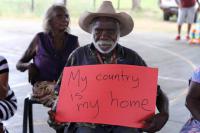Activists trying to save remote ancestral communities from destruction by Australian governments are again appealing for your support in their fifth global call to action. The appeal comes from #SOSBLAKAUSTRALIA, a group formed in November 2014 specifically to stop the forced closure of Aboriginal communities. The group says service providers have already been told not to renew their contracts. They refer in a media release to an announcement that eight indigenous individuals have been confirmed to determine the fate of 274 Aboriginal communities in Western Australia, while the state’s government claims this to be a ‘consultative process’.
The people appointed are Patrick Davies, Brenda Garstone, Mary O'Reeri and Martin Sibosado to the Kimberley Council and Adrian Brahim, Kate George, Triscilla Holborow and Jason Masters to the Pilbara Council.
A similar appeal in May triggered protests across several countries and attracted wide international media attention.
“A new date has been set for the 5th Global Call to Action – Friday 27th November 2015.”
#SOSBLAKAUSTRALIA claims an extended reach in excess of 12 million people and a direct reach close to 75,000.
“Our goal goes well beyond any ‘consultation’. Regardless of who is prime minister, we are committed to keeping our communities on their homelands and we have been consulting among our own people to develop sustainable and viable models for communities, outstations and seasonal campsites.
“To support this work, we are steadily galvanising support from NGOs, unions, the legal fraternity and public figures and have built a skills database with submissions from thousands of everyday people worldwide, who care as much as we do about our Aboriginal culture and human rights.
“#SOSBLAKAUSTRALIA itself will be scaled up to increase its capacity, whilst supporting a cultural revolution, political platform and fundraising campaign."
The Western Australian government announced on its website: “Eight Aboriginal Leaders have been appointed to help the State Government drive major reforms to the way infrastructure and services and provided to Aboriginal communities in Western Australia. They will join Strategic Regional Advisory Councils being established in the Kimberley and Pilbara to advise the State Government on regional services reform.”
#TEAMSOS has commented to me in an email: “Essentially the government now are calling ‘frced closure’ ‘reform’ - it's all one and the same and as we know they have already issued letters to the service providers to not renew their contracts.
“By donating now, you will be making a
contribution to enable Aboriginal Communities to access green energy, which is
a critical step forward in viability and one we will be able to leverage on for
further support."
Four Australian music giants - including Aborigines Archie Roach and Emma Donovan - have banded together to record new versions of two classic Indigenous tracks, Blackfella/Whitefella by Warumpi Band and Roach’s Down City Streets. Sale proceeds will go to SOS Blak Australia and a nationwide movement to support remote Indigenous Australian communities, including those under threat from an end to government funding in Western Australia. ‘It’s important that we keep people on country,’ Roach says, ‘because country keeps us safe, keeps us strong’.
Hear them explain what they’re doing, and part of one of the songs, in this video.
See past linksunten coverage of the remote communities issue:
Remote Indigenous outstation rejects Australian government policy and opens own school
West Australian plan to close 100 remote and Indigenous communities 'devastating'
Closure of remote communities devastates Aboriginal residents
Maori politicians support Aboriginal protest over proposed closure of indigenous communities
Aboriginal Australian communities send a powerful message to government
South Australian Aboriginal communities hold emergency summit to fight 'cultural genocide'
International anger swelling at plans to evict Australian Aborigines from ancestral lands
French researchers: “Aboriginal communities should not be closed!”
Aborigines appeal to UN indigenous forum over homelands closure plans
Aboriginal Australian communities announce a global call to action
Stop the forced closure of Aboriginal communities in Australia -- Call-to-Action day!
'Systemic racism' against Aboriginal communities is savaged at the United Nations
By evicting the homelands, Australia has again declared war on Indigenous people
Government cuts off water to remote Australian Aboriginal settlement


More Aboriginal news
Stop paperless arrest laws from killing more Aborigines
Amnesty International Australia says paperless arrest laws in the Northern Territory put adults and children at risk of arbitrary detention by police and unfairly target disadvantaged Indigenous people. “If these laws are not repealed, more Indigenous people will be locked up and more unnecessary deaths in custody will follow.”
More than 12,000 people have signed a petition calling on Northern Territory Attorney-General John Elferink to immediately repeal the paperless arrests scheme.
In August, Territory coroner Greg Cavanagh found the laws would cause more Aboriginal deaths in custody. Their legal validity is now being determined by the High Court of Australia.
1 in 6 jail rate and 1 in 3 suicide rate are tools of the oppressor
The bloodshed of colonialism continues in narratives of human misery and suffering, in a climate of death; in the suicides and in the premature and unnatural deaths. The descendants of the invaders are now established as the governments, ruthlessly gripping power.
Modalities such as institutional racism continue. Marginalisation appears entrenched.
The makeup of Australia's parliaments is racist. Australia’s racism can be found not only in The White Australia Policy but also in its Constitution, in its various institutions and instruments, in its immigration policies, in its marginalisation of a significant proportion of the Aboriginal and/or Torres Strait Islanders population and in the expectation that assimilation is the only engagement that it will have with them.
Australia’s racism can be seen in its prisons – jailing Aboriginal and/or Torres Strait Islanders at the world’s highest rates. Australia’s racism can be found in the underclasses of various poverty and disenfranchisement it induces upon migrants. Australia’s racism can be found in the disproportionate suicide rates among Aboriginal and/or Torres Strait Islanders and among the waves of migrants and the first generation descendants of the waves of migrants.